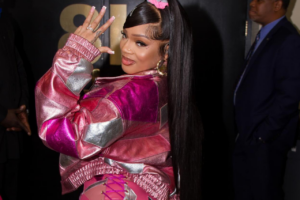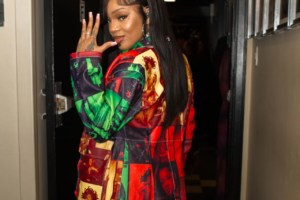In the heart of Memphis, where rhythm flows as naturally as the Mississippi River, Gloria Hallelujah Woods’ story began in a household that embodied both struggle and spiritual richness. As the eighth of ten children, GloRilla’s early life was shaped by the kind of close-quarters living that either breaks spirits or forges unbreakable bonds. In her case, it was decidedly the latter.
The Woods household operated like a small community unto itself, with seven children sharing one room, sleeping on a single queen-size air mattress—a detail GloRilla recalls with a mixture of humility and wonder.
“I never had a real bed in my whole life until I was 15”
she reflects, a testament to the genuine hardship that would later inform her authentic artistry. This wasn’t just about physical space; it was about learning to navigate life with limited resources while maintaining dignity and dreams.
Their home, situated seven houses down from the local school, became a window to a world GloRilla could only observe from afar during her homeschooling years. She would watch other children walking home at 2:15 PM, their laughter and camaraderie a daily reminder of the social connections she yearned for. This perspective—being simultaneously inside and outside of mainstream society—would later become a powerful lens through which she would craft her narratives in music.

The spiritual foundation of GloRilla’s upbringing was equally formative. Under the guidance of her deeply religious mother, the family attended church three times a week, where young Gloria found her first stage in the choir and liturgical dance team. Dressed in long white dresses, performing sacred movements, she developed not just a spiritual practice but an early understanding of performance and its power to move people. The influence of gospel legends like Kirk Franklin and Yolanda Adams provided her first musical education, though she would later forge a path far from these sacred roots.
Perhaps most distinctive was the environment that shaped her signature sound—the Memphis accent that would later become one of her most recognizable attributes. “I had never knew we had an accent ever until like I blew up,” she recalls with characteristic candor. This linguistic authenticity, initially a source of surprise when she began reaching wider audiences, would become one of her greatest assets in an industry often criticized for its homogeneity.
The family’s economic reality was stark but resourceful. They relied on food stamps and made regular trips to the commodity house for blocks of cheese and staples, a experience shared by many in their community. Yet within these constraints, GloRilla’s mother fostered independence and responsibility, particularly in her eighth child. Despite her youth, Gloria became her mother’s unofficial assistant, managing receipts and remembering passwords—early training in the kind of detail-oriented focus that would serve her well in her future career.
These formative years in Memphis didn’t just shape GloRilla’s sound or style; they created the foundation for an artist who would never need to manufacture authenticity. Her story reminds us that true artistry often emerges not from privilege or formal training, but from the rich, complex tapestry of real-life experience—where hardship and hope dance together like Sunday morning gospel and Saturday night blues.

In the unforgiving landscape of aspiring artistry, where dreams often collide with reality, GloRilla’s pre-fame journey reads like a masterclass in persistence. Before her name blazed across billboards and her music reverberated through stadium speakers, she worked the drive-thru at Checkers, mastering the art of customer service with the same intensity she would later bring to her lyrics.
The daily rhythm of fast-food work might seem far removed from the pulsing beats of hip-hop stardom, but for GloRilla, it was a crucial chapter in her story. With remarkable recall, she can still recite the prices from memory: “$7.31 for the number seven, add a sweet tea, that’s $1.10 more.” This attention to detail, initially born of necessity, would later serve her well in crafting precise, memorable lyrics that would capture millions of listeners.
But Checkers was just one stop on a winding road. The Nike warehouse followed, where long hours and physical demands provided both steady income and an education in perseverance. These jobs weren’t just about survival; they were calculated steps in a larger plan. With each paycheck, GloRilla would methodically allocate funds:
“I could put $200 towards a video”
she recalls, describing how she invested in her future while her peers focused on immediate gratifications.The financial tightrope she walked was precarious. Her car was repossessed—a setback she met with characteristic resourcefulness, parking behind friends’ vehicles to evade the repo man. She couch-surfed when necessary, swallowing pride that had previously kept her fiercely independent. These weren’t just hardships; they were the forge in which her resilience was tempered.
Perhaps most telling was her approach to the music business itself. In an industry where exposure is currency, GloRilla invested in herself, paying to perform at shows featuring established artists. “If you upcoming artist and you want to be known, you got to pay for this,” she explains with the pragmatism of someone who understands that success rarely comes without investment.
The turning point arrived through an unexpected combination of discipline and spirituality. In early 2022, facing her lowest point, GloRilla and her friend embarked on a 60-day fast—not just from food, but from the distractions that had clouded their focus. No drinking, no going out, just pure dedication to the craft. It was during this period of intentional focus that “F.N.F.” was created, the song that would eventually catapult her to stardom.

This chapter of GloRilla’s story illuminates a crucial truth about success in the music industry: before the glamour comes the grind. Her journey from behind the counter to behind the mic wasn’t marked by a single lucky break but by countless small decisions to invest in herself, to persist when others might have surrendered, and to maintain unwavering faith in her vision.
The hustle before the fame wasn’t just about surviving; it was about building the foundation for an artist who would never take success for granted. In the end, those long hours at Checkers, the strategic investments in her career, and even the setbacks weren’t obstacles to her success—they were essential ingredients in creating an artist whose authenticity would resonate with millions.
In an era where viral moments often eclipse artistic substance, GloRilla’s ascent in the music industry stands as a testament to the enduring power of authenticity. Her breakthrough wasn’t manufactured in a boardroom or engineered by marketing executives—it emerged organically from the streets of Memphis, carried by a voice as distinctive as it is genuine.
The pivotal moment arrived with “F.N.F.,” a track that captured attention not through elaborate promotion but through raw resonance. The song’s journey from local hit to national phenomenon began with a simple video, the kind of content GloRilla had been creating consistently long before fame knocked on her door. When DJ Duffy, French Montana’s DJ, shared the track, it initiated a cascade of industry recognition that would ultimately reshape GloRilla’s trajectory.
Yet, even as success mounted, GloRilla faced a challenge familiar to many breakthrough artists: the pressure to replicate initial success.
“When I dropped my EP and it did good too and I had sold out my first tour… it was like okay, I sold out my first tour with the small rooms, so now I got to make bigger songs and get the bigger rooms”
she reflects. This pressure to scale up, to consistently outdo oneself, has derailed many promising careers. However, GloRilla’s partnership with Yo Gotti’s CMG label provided something unique—a mentor who understood not just the music, but the cultural context from which it emerged.
What sets GloRilla’s relationship with CMG apart is Gotti’s approach to her artistry. While other labels fixated on “F.N.F.” as a moment to replicate, Gotti looked beyond the hit. “I don’t even want to talk about F.N.F… let me hear what else you got,” he told her during their initial meetings. This focus on artistic depth over commercial exploitation would prove crucial in maintaining GloRilla’s creative authenticity.
The industry validation continued to accumulate. Cardi B’s remix collaboration arrived not through formal channels but through genuine artistic appreciation. The moment GloRilla discovered Cardi had recorded a verse for one of her tracks exemplifies the organic nature of her rise—she found out through her team, who had been keeping it as a surprise. These authentic connections, from Cardi B to LeBron James singing her lyrics, emerged not from strategic planning but from genuine appreciation of her artistry.
Perhaps most significantly, GloRilla’s impact extends beyond personal success to influence industry perspectives on regional authenticity. Her unapologetically Memphis accent and delivery style have challenged industry assumptions about what constitutes “mainstream” appeal. In an age of increasingly homogenized sound, she’s proven that distinctiveness—when paired with genuine talent—can resonate universally.

This evolution hasn’t been without its challenges. Social media’s double-edged sword of visibility and vulnerability has required careful navigation. Yet GloRilla’s approach to criticism reveals mature insight: “Criticism, I like it… I want y’all to be dead honest with me because when I go out in the public, they going to say it anyway.” This willingness to face feedback head-on while maintaining artistic integrity demonstrates the kind of resilience that sustains careers beyond viral moments.
In the contemporary music landscape, where authenticity is often claimed but rarely proven, GloRilla’s journey stands as a blueprint for organic artistic growth. Her evolution from Memphis phenomenon to national star hasn’t required reinvention—only refinement of the raw talent and genuine voice that captured attention in the first place.
In an industry often criticized for its manufactured personalities and calculated personas, GloRilla’s philosophical approach to artistry emerges as refreshingly unvarnished. Her perspective on fame, success, and authenticity isn’t crafted for media soundbites—it’s forged from lived experience and an unwavering commitment to personal truth.
At the heart of GloRilla’s philosophy lies a profound understanding of faith’s role in sustaining vision. Rather than viewing success through the lens of material acquisition or social media metrics, she grounds her perspective in spiritual foundation. “I’m super big on God,” she reflects, explaining how her mother’s prayers—even those she didn’t know were being said—carried her through the darkest periods. This spiritual anchor provides a counterbalance to the industry’s often superficial measures of success.
Her approach to social media criticism reveals a particularly nuanced understanding of authenticity in the digital age. Unlike many artists who either avoid engagement entirely or become consumed by online discourse, GloRilla maintains a measured perspective: “The thing with me is criticism, I like it.” This isn’t mere bravado—it’s a strategic approach to growth. She views criticism as a tool for refinement rather than a weapon of destruction, understanding that public feedback, while sometimes harsh, often contains kernels of truth worth examining.

Perhaps most striking is her perspective on gender dynamics within the industry. Drawing from her experience growing up with six brothers, GloRilla brings a unique lens to the often-discussed topic of women in hip-hop. She observes that women face heightened scrutiny, noting how “social media be way harder on females than men.” Yet rather than viewing this as an insurmountable obstacle, she transforms it into motivation, using the pressure to fuel her creative fire.
The weight of representation isn’t lost on her either. As a female artist from Memphis, she carries the dual responsibility of representing both her gender and her city. This intersection of identities informs her artistic choices, from her unapologetic maintenance of her accent to her conscious decision to address complex themes in her music. When she speaks about being “that girl,” it’s not just braggadocio—it’s an affirmation of her role as a cultural torchbearer.
Her philosophy on success is equally grounded. “Everything is perfect timing,” she asserts, reflecting on her rapid rise to fame. This perspective allows her to view her journey not as a series of lucky breaks but as a natural progression of dedicated effort meeting divine timing. It’s a viewpoint that helps her navigate the industry’s pressure to constantly outdo oneself, maintaining artistic integrity while pursuing growth.
Most notably, GloRilla’s vision extends beyond personal success to industry impact. Her insistence on maintaining her authentic voice—from her distinctive Memphis accent to her unfiltered perspective on life—challenges industry conventions about what constitutes “marketable” artistry. In doing so, she’s not just building a career; she’s helping to reshape the landscape for future artists who might not fit traditional industry molds.
This philosophical approach to artistry, grounded in authenticity while remaining open to evolution, suggests that GloRilla’s impact on hip-hop culture may extend far beyond her musical contributions. In an era of careful curation and strategic brand building, her commitment to genuine self-expression offers a compelling alternative path to sustained relevance.
As GloRilla approaches her 30th year, her vision for the future reflects a maturity that belies her rapid ascent to fame. “I might not talk about the exact same things, but I’mma still be that…” she declares, letting the statement hang with the weight of both promise and prophecy. It’s a declaration that encapsulates her approach to evolution—embracing growth while maintaining the core authenticity that resonates with millions.
The challenge of sustained relevance in hip-hop’s ever-shifting landscape isn’t lost on her. Where many artists might chase trends or attempt to recreate past successes, GloRilla’s approach to future projects reveals a more nuanced understanding of artistic development. Her decision to release a mixtape rather than an album illuminates this strategy—choosing artistic freedom over industry pressure. “I was thinking too hard because I was in album mode,” she reflects, explaining how the shift in mindset unleashed a new wave of creativity.
This understanding of creative pressure and how to navigate it suggests a sophisticated approach to career longevity. Rather than viewing each release as a make-or-break moment, GloRilla approaches her craft with the patience of someone building a legacy rather than chasing hits. Her collaboration wishlist—including titans like Beyoncé, Drake, and Lil Wayne—speaks to ambitions that extend beyond temporary chart success to lasting cultural impact.
The Memphis heritage factor plays a crucial role in her legacy-building strategy. As one of the city’s most prominent new voices, she carries the responsibility of representing a rich musical tradition while pushing it forward. Her partnership with Yo Gotti’s CMG label strategically positions her at the intersection of Memphis’s storied past and its evolving future, ensuring her impact resonates both locally and globally.
Looking ahead, GloRilla’s approach to commercial success versus artistic integrity offers a masterclass in balance. She’s learned to trust her instincts while remaining open to guidance, particularly from mentors like Yo Gotti who understand both the art and business of music. This balanced approach suggests a future where commercial success and artistic authenticity aren’t mutually exclusive but mutually reinforcing.
Perhaps most significantly, her impact on the next generation of female artists is already taking shape. By maintaining her distinctive voice—both literally and figuratively—while achieving mainstream success, she’s creating a blueprint for authenticity in an industry often criticized for its homogeneity. Her success challenges conventional wisdom about what a female rapper should sound like, look like, or represent.
As she builds toward her thirties, GloRilla’s trajectory suggests an artist preparing not just for the next hit but for a lasting legacy. Her understanding that evolution doesn’t require reinvention, that growth doesn’t demand abandonment of roots, positions her uniquely in hip-hop’s landscape. In an industry where many artists flame out as quickly as they rise, GloRilla’s approach to future-building suggests something more sustainable—a career built on the solid foundation of authentic artistry rather than the shifting sands of trending moments.
The future of hip-hop may be uncertain, but GloRilla’s place in it appears increasingly secured—not by chasing trends or conforming to expectations, but by consistently delivering her truth through her music, her way.
In the ever-evolving landscape of contemporary hip-hop, where authenticity often feels like a marketing buzzword rather than a lived reality, GloRilla stands as a powerful reminder of what genuine artistry looks like. Her journey from the humble streets of Memphis to the glittering heights of music industry success offers more than just an inspiring narrative—it provides a blueprint for maintaining artistic integrity in an age of careful curation and calculated personas.
GloRilla’s story resonates beyond the confines of her immediate success because it touches on universal truths about perseverance, faith, and the power of remaining true to one’s roots. From those early days sharing an air mattress with siblings to commanding stages alongside industry titans, she has maintained the raw authenticity that first captured audiences’ attention. Her distinctive Memphis accent, once something she never even recognized as unique, has become a powerful symbol of regional pride in an increasingly homogenized musical landscape.
The impact of her success extends far beyond personal achievement. For Memphis, a city with a rich but often overlooked hip-hop legacy, GloRilla represents a new chapter in cultural storytelling. Her partnership with Yo Gotti’s CMG label demonstrates how local authenticity can translate to global appeal without compromising its essential character. For aspiring artists, particularly young women from backgrounds similar to hers, she provides living proof that commercial success doesn’t require conforming to industry stereotypes.
Perhaps most significantly, GloRilla’s approach to evolution—embracing growth while maintaining core authenticity—offers a sustainable model for long-term artistic relevance. In an industry often criticized for its disposable nature, her commitment to genuine artistic expression while remaining open to creative development suggests a career built for longevity rather than momentary fame.
As hip-hop continues its journey as America’s dominant cultural force, voices like GloRilla’s become increasingly crucial. They remind us that beneath the gloss and glamour of commercial success, the heart of hip-hop still beats in the authentic stories of those who dare to tell their truth, their way. In doing so, GloRilla isn’t just building a career—she’s contributing to the cultural legacy of a genre that has always found its greatest strength in genuine expression.
Her story, still unfolding, suggests that the future of hip-hop might not belong to those who chase trends or conform to expectations, but to those who, like GloRilla, remain unwaveringly true to their artistic vision while embracing the natural evolution that comes with growth and experience. In this way, she isn’t just creating music—she’s creating a template for authentic success that may well inspire generations to come.
In an era where success often seems predicated on careful curation and strategic reinvention, GloRilla’s meteoric rise presents a compelling counter-narrative. Her journey from the unvarnished streets of Memphis to the polished stages of mainstream success offers more than just an inspiring story—it provides a masterclass in the power of unwavering authenticity.
The foundation of GloRilla’s impact lies in her refusal to code-switch, even as her platform expanded. That distinctive Memphis accent, which she never recognized as unique until fame brought her beyond city limits, has become more than just a vocal signature—it’s a statement of cultural pride. In maintaining these linguistic roots, she challenges industry assumptions about what constitutes “mainstream appeal,” proving that authenticity can resonate more powerfully than conformity.
Her approach to artistic evolution demonstrates a sophisticated understanding of growth versus transformation. While many artists attempt to reshape themselves with each new level of success, GloRilla’s evolution feels more like a natural unfolding than a calculated reinvention. “I might not talk about the exact same things,” she reflects on her future, “but I’mma still be that…” This simple statement encapsulates a profound truth about sustainable success: growth doesn’t require abandonment of one’s essential self.
Perhaps most significantly, her impact extends beyond individual achievement to influence industry perspectives on regional authenticity. In an age of increasingly homogenized sound, GloRilla’s success challenges the notion that artists must sand down their rough edges to achieve mainstream acceptance. Her partnership with Yo Gotti’s CMG label demonstrates how local authenticity can translate to global appeal without compromising its essential character.
The “GloRilla Effect” might well become shorthand for a new model of artistic development—one that values genuine expression over manufactured appeal. Her journey suggests that the path to lasting relevance isn’t through careful calculation but through unflinching authenticity. As hip-hop continues to evolve as America’s dominant cultural force, her example offers hope that the genre’s future belongs not to those who chase trends, but to those brave enough to tell their truth, their way.
For aspiring artists, particularly those from backgrounds or regions often overlooked by the mainstream industry, GloRilla’s success provides a blueprint for authenticity-driven achievement. Her story demonstrates that commercial success and cultural integrity aren’t mutually exclusive—they can be mutually reinforcing when approached with genuine conviction.
In the final analysis, GloRilla’s impact transcends the boundaries of music to touch on broader cultural questions about authenticity, representation, and the power of staying true to one’s roots. Her continued success suggests that perhaps the industry isn’t as opposed to authenticity as conventional wisdom might suggest—it’s just been waiting for artists brave enough to present their unvarnished truth to the world.


